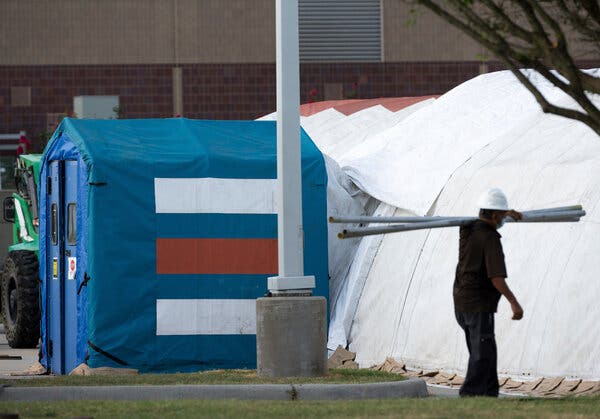
Two court rulings on Tuesday cleared the way for local leaders who oppose a ban by Gov. Greg Abbott of Texas on mask mandates to at least temporarily require face coverings to help curb a rise in cases.
The first ruling came in Bexar County, which includes San Antonio. Masks can now be required in public schools and other public buildings there.
Masks will also be required for county and city employees, said Andy Segovia, the city attorney for San Antonio. The chief executive of Bexar County, Judge Nelson W. Wolff, said that the ruling was important because many students who are too young to be vaccinated would otherwise be coming back to school with no protection.
The second ruling was delivered by a district judge in Dallas County who said the ban prevented officials from protecting residents during an emergency.
“Dallas County citizens will be irreparably harmed” if local leaders cannot require face coverings to stop the transmission of the virus, the judge, Tonya Parker, wrote in the ruling.
In light of the decision, Clay Jenkins, the county’s chief elected official, said he planned to issue an emergency order for the county on Wednesday.
On Tuesday, Texas recorded 20,000 new virus cases, nearly double the number of cases as two weeks ago, according to a New York Times database.
Some hospitals in the state are nearing capacity and are bracing for an influx of patients. The intensive care unit at Houston’s Lyndon B. Johnson Hospital is at full capacity, and 63 percent of those patients are Covid cases, CNN reported.
On Tuesday, a temporary mask mandate for students, staff members and visitors to public schools in Dallas went into effect.
Brendan Steinhauser, a consultant who lives in a Republican-leaning suburb of Austin, said the rising number of cases had led more people to wear masks.
“It is palpable,” he said of his neighbors’ mask-wearing attitude. “I noticed it and it was like, ‘Whoa.’”
Correction: An earlier version of this item misspelled the surname of Bexar County’s chief executive. He is Judge Nelson W. Wolff, not Wolf.
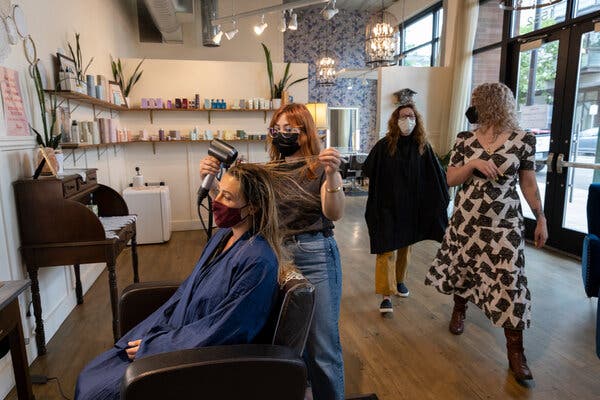
Oregon is preparing to restore a statewide mandate, ordering both vaccinated and unvaccinated people to use face coverings when gathering indoors, just the third state to do so.
Gov. Kate Brown of Oregon, a Democrat, said on Tuesday that she would formally announce the return of the mask mandate on Wednesday. She said that masks were needed to fight rising caseloads driven by the Delta variant, and that face coverings were a simple tool to help keep schools and businesses open.
“After a year and a half of this pandemic, I know Oregonians are tired of health and safety restrictions,” Ms. Brown said in a statement. “This new mask requirement will not last forever, but it is a measure that can save lives right now.”
While many states brought in mask mandates and other restrictions last year, they have been loath to re-implement such orders amid rising case numbers. Two states led by Republican governors, Texas and Florida, have barred mask mandates entirely, though some local leaders plan to impose them anyway.
Some states have mask mandates for unvaccinated people who gather indoors, but Oregon joins Louisiana and Hawaii as the only states to extend the mandates to vaccinated people. Washington, D.C., has also reinstated its mask mandate, as have several large cities.
On Tuesday, Gov. Andy Beshear of Kentucky said that masks would again be mandated in all of the state’s schools.
Oregon has made it through the pandemic with some of the lowest coronavirus case numbers and death numbers in the country. But cases in the state, as in much of the country, have been surging in recent days, rising from an daily average of 110 a month ago to more than 1,180.
With 84 percent of people over 65 fully vaccinated in the state, the rise in deaths has been far smaller, reaching a daily average of six as of Wednesday. But Covid hospitalizations have quadrupled in the past month, and the daily average of hospitalized patients is more than 550.
Ms. Brown’s office cited new modeling that projects that the state’s hospital capacity could be overrun in the next several weeks if mitigation measures are not in place, leaving Oregon as many as 500 beds short by September.
“When our hospitals are full, there will be no room for additional patients needing care — whether for Covid-19, a heart attack or stroke, a car collision or a variety of other emergency situations,” Ms. Brown said. “If our hospitals run out of staffed beds, all Oregonians will be at risk.”
Ms. Brown also said that all employees working under the state’s executive branch would be required to be fully vaccinated. Gov. Jay Inslee of Washington State, a Democrat, announced a similar mandate on Monday.
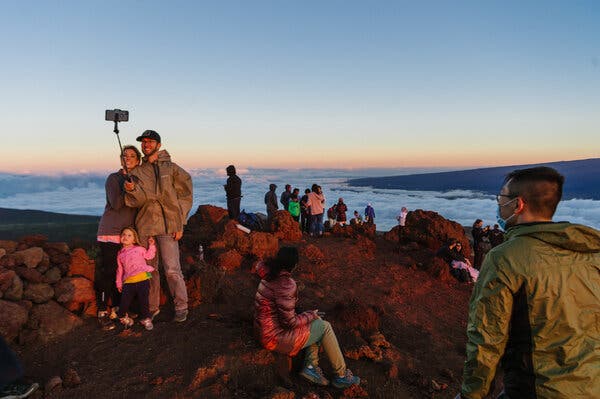
After a week in which Hawaii reported more new daily cases than in any other week of the pandemic, Gov. David Ige said on Tuesday that he was reimposing restrictions to try to curb the surge.
“Social gatherings will be limited to no more than 10 people indoors and 25 people outdoors,” he said at a news conference. Indoor events will be reduced to 50 percent physical capacity — including in bars, restaurants, gyms and houses of worship — he said, and masks must be worn at all times except when actively eating or drinking.
The measure, which went into effect immediately, came five days after Mr. Ige, a Democrat, ordered all state and county employees to show proof of vaccination by next Monday or face weekly testing. While that policy affects tens of thousands of residents in Hawaii, Mr. Ige said that he believed it was not enough.
“We know that we won’t see benefits from the increase in vaccinations going up for another six to seven weeks,” he said on Tuesday. “In the meantime, we must take action now in order to slow the spread of Covid-19, especially with the new Delta variant, which has wreaked havoc in our communities.”
Hawaii has had the country’s fewest cases per capita over the course of the pandemic, but its number of patients hospitalized with Covid has soared from just 40 on July 1 to 246 on Tuesday, of whom 235 are unvaccinated.
“That’s a pretty rapid trajectory,” said Hilton Raethel, the chief executive of the Healthcare Association of Hawaii, a nonprofit that represents hospitals, skilled nursing facilities, assisted living facilities, home care companies and hospices. “Hospitals are full, and then you have all these Covid patients. That really stretches our health care system.”
Mr. Raethel said in an interview on Tuesday that the first of 550 additional health care workers would arrive this weekend from the U.S. mainland. Only one other time during the pandemic has the state needed reinforcements from the mainland, he said, and that was last September and October during Hawaii’s last peak.
“We’re not even at the peak of the surge yet,” he added. “The numbers tell us that the worst of the surge is in front of us.”
The state, with a population of 1.4 million, has a seven-day average of more than 500 cases per day and a test positivity rate of 7.25 percent, Mr. Ige said on Tuesday.
Eighty-six percent of Hawaii residents 18 and older have had at least one vaccine dose, but only 65 percent are fully vaccinated, according to a New York Times database. People younger than 12 are not eligible for vaccination in the state.
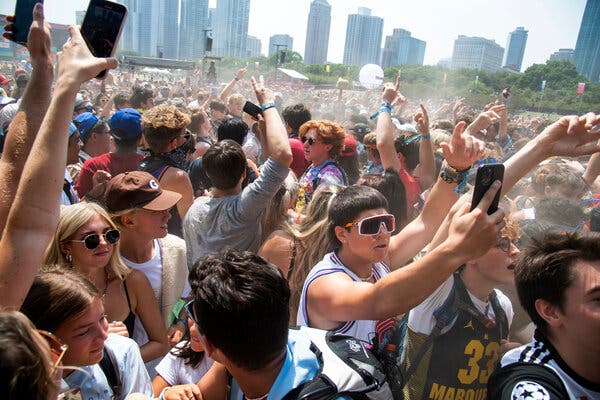
The recent rise in coronavirus cases, fueled by the highly contagious Delta variant, has led to the cancellation of several upcoming musical performances.
The group Jason Isbell & The 400 Unit’s show scheduled for Wednesday in Houston has been canceled, according to a statement on Tuesday from Mr. Isbell’s music label, Southeastern Records. The venue, Cynthia Woods Mitchell Pavilion, “was not willing to comply with the band’s updated Health and Safety standards,” it read. Tickets bought online will be refunded, according to the statement.
Also on Tuesday, the singer Stevie Nicks said that although she is vaccinated, she is canceling the shows she was scheduled to perform this year, because of the rising number of cases.
“I want everyone to be safe and healthy and the rising Covid cases should be of concern to all of us,” Ms. Nicks, 73, said in a statement on Twitter. “While I’m vaccinated, at my age, I am still being extremely cautious and for that reason have decided to skip the 5 performances I had planned for 2021.”
Over the weekend, the New Orleans Jazz & Heritage Festival said that it was canceling this year’s event, citing the rise in cases.
In June, Bruce Springsteen became the first person to perform on Broadway as some New York City theaters reopened after closing 16 months earlier because of the pandemic. Before his first performance, Mr. Springsteen told ticket holders that they would be admitted only if they showed proof of vaccination.
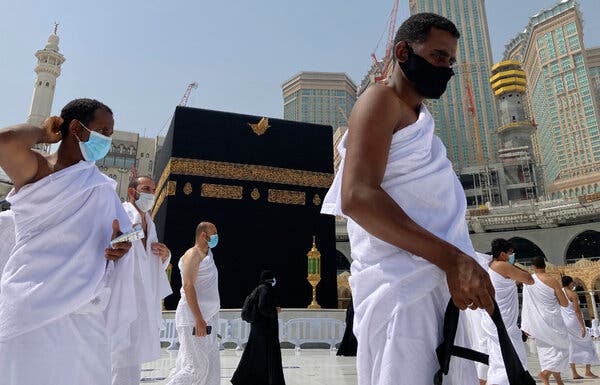
BEIRUT, Lebanon — Saudi Arabia has resumed allowing travelers from abroad to make a pilgrimage to Mecca, the kingdom announced this week, a new easing of the restrictions imposed last year to prevent the spread of Covid-19 at the Islamic holy sites.
Aspiring pilgrims from many countries can now apply to perform the lesser pilgrimage to Mecca, known as umrah, as long as they can provide proof that they have received a coronavirus vaccine approved by the Saudi authorities, the state-run Saudi Press Agency reported on Sunday. The new policy took effect on Monday.
The kingdom has approved the vaccines made by Moderna, Pfizer-BioNTech, Johnson & Johnson and AstraZeneca. Foreigners who have received two doses of either the Sinopharm or Sinovac vaccines can enter only if they have also received a third shot of one of the four approved vaccines.
As the pandemic spread last year, Saudi Arabia barred travelers from abroad from the main pilgrimage, the hajj, which attracts millions of pilgrims in normal years, spreading disappointment across the Muslim world. Devout Muslims who are physically and financially able are required to perform the hajj, one of the five pillars of Islam, at least once during their lives.
Last year, only a few hundred pilgrims who were already in the kingdom were allowed to go.
Foreign travelers were also barred from this year’s hajj, which was in July.
Umrah can be performed at any time of the year. Allowing vaccinated foreign travelers to apply for it represents a step toward restoring the prepandemic status quo at the holy sites.
The number of permitted foreign visitors will initially be limited and will increase over time, with the goal of eventually allowing two million pilgrims a month.
Other restrictions, including limiting the number of worshipers in mosques and on buses, will also be enforced to decrease the chances of infection. As of Monday, Saudi Arabia had averaged 732 new cases a day over the last week, a 40 percent decline from two weeks ago, according to the Center for Systems Science and Engineering at Johns Hopkins University.
Saudi Arabia still bans direct travel from a number of countries that it has deemed viral threats. Pilgrims from other countries must observe a mandatory seven-day quarantine on arrival. About 29 percent of Saudi residents are fully vaccinated, according to the Our World in Data project at the University of Oxford.
Besides having deep religious significance, the pilgrimage is big business and the ban on foreign worshipers hurt companies across the Islamic world that cater to pilgrims.
Before the pandemic, Jamal Ali, who works at a Beirut travel agency that specializes in religious tourism, sold a range of packages including plane tickets and hotel stays. The ban on foreign pilgrims cut his income by about 90 percent, he said.
He hoped that the resumption of foreign trips to Mecca would be a step back toward normalcy.
“We understand that Saudi Arabia is trying to achieve general immunity,” he said. “We are waiting for relief from God, and for this pandemic to end.”
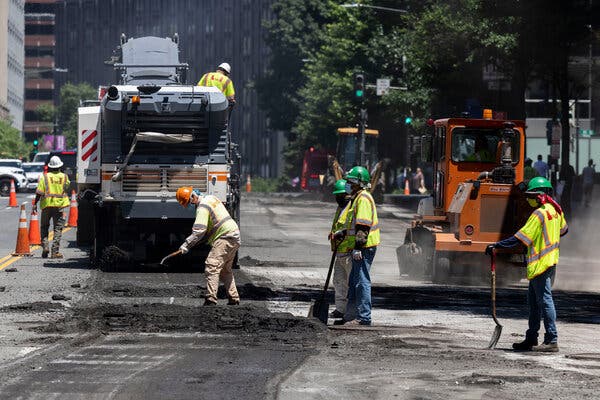
Mayor Muriel E. Bowser of Washington on Tuesday directed all 37,000 city employees and contractors who work with the city to get vaccinated against the coronavirus, or undergo weekly testing by Sept. 19.
The action follows President Biden’s recent announcement that federal workers would face restrictions and requirements, including testing, if they did not get vaccinated. New York, Virginia, Hawaii and Puerto Rico, have made similar moves, while Gov. Jay Inslee of Washington State said Monday that most state employees and all health care workers had to be fully vaccinated or risk losing their jobs.
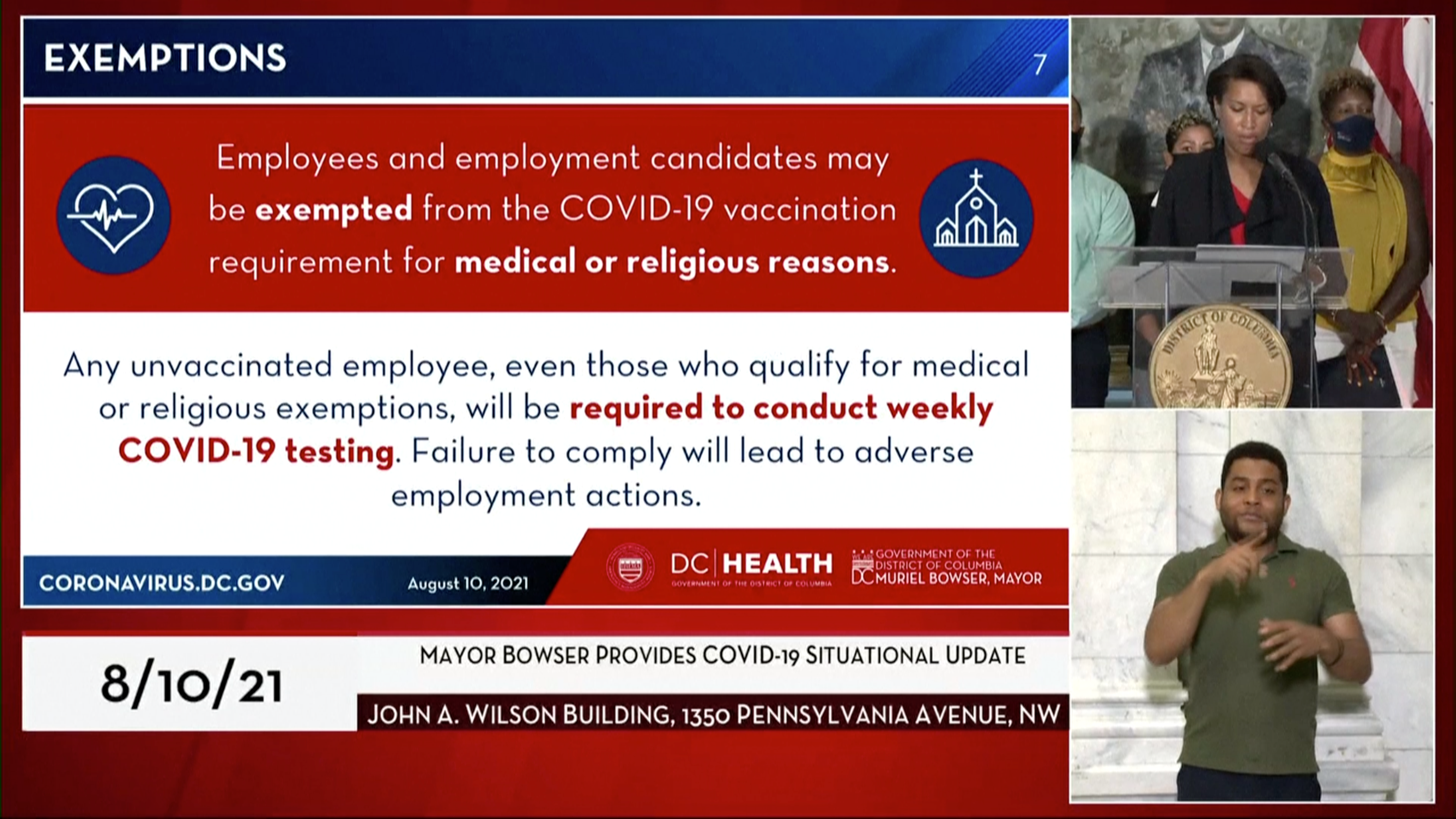
Additionally, the Pentagon said Monday that it will seek to make vaccinations mandatory for the country’s 1.3 million active-duty troops “no later” than the middle of next month.
“We know that we have been very steadfast and successful in crushing this virus in the district,” Ms. Bowser said at a news conference. “And now we’re going to do the same with the Delta variant. The way to do it, however, is to get everybody vaccinated.”
The policy falls short of a mandate, but all new hires filling job vacancies posted on Aug. 14 or later will need to show proof of vaccination.
“We will, of course, have a process for people who want to apply for exemptions and any unvaccinated employee, even those who qualify for the medical or religious exemption, will be required to conduct a weekly Covid-19 test and failure to comply will lead to adverse employment actions,” Ms. Bowser said.
Only 59 percent of city employees have reported their vaccine status, according to the mayor’s office. Of those, 54 percent are vaccinated.
Daily new cases across the city have soared, according to a New York Times database, which also shows that hospitalizations have risen 5 percent and that there were three deaths over the same period.
Fifty-three percent of all city residents are fully vaccinated, according to federal data. People younger than 12 are not eligible for the vaccine.
“What’s driving our increasing cases right now is really that 25-to-34-year-old population,” Dr. LaQuandra Nesbitt, the director of the city’s health department, said at the news conference. “And we don’t see any meaningful disparities in terms of who are those new cases from a race and ethnicity perspective.”
But Dr. Nesbitt added that there was a wide gap in vaccine coverage for that age group, with Black residents having half the rate of coverage as their white and Latino counterparts.
“We are also going to do a better job once everybody gets vaccinated and helping to prevent more of these variants from taking over our communities,” she said.
The city gives incentives to all city residents, including public employees, who are 12 and older, like a $51 gift card for receive their first dose of the vaccine at one of its three walk-up vaccination sites. And residents ages 12 to 17 get AirPods for being among the first 400 youths to get inoculated at school vaccination sites.
global roundup
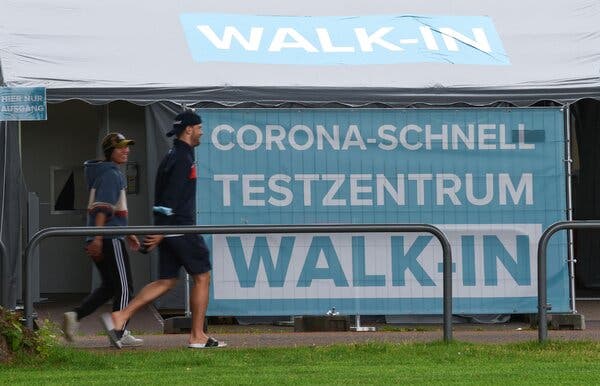
BERLIN — After months of offering free coronavirus antigen tests to all residents, Germany will stop subsidizing them for adults who choose not to get vaccinated, Chancellor Angela Merkel announced Tuesday.
Starting Oct. 11, when the changes take effect, the tests will continue to be available at no charge for people under 18, pregnant women or others who have medical reasons not to get vaccinated.
Since March, the country has spent billions of dollars offering at least one free antigen test per resident each week, which has led to a boom of privately run testing stations.
Ms. Merkel met with state governors on Tuesday to negotiate the new rules, as infections, driven by the highly contagious Delta variant, are increasing, albeit more slowly than in many other parts of Europe.
German authorities have also agreed on new rules requiring proof of vaccination, recent recovery or a negative test for certain indoor activities, including going to a restaurant, hairdresser or gym, once the weekly local infection rate surpasses 35 per 100,000 inhabitants.
As of Monday, the authorities had registered 23.5 new infections per 100,000 inhabitants per week nationwide. Currently 55 percent of Germans have received the full vaccination course and 62.5 percent received the first jab, a rate, as Ms. Merkel noted during her news conference, that was no longer among the highest in the European Union.
“We now have enough of the vaccine,” she said. “Now we have to promote vaccinations.”
In other news from around the world:
-
In June, European Union leaders recommended that member countries reopen their borders to Americans, expecting to be repaid in kind. But nearly two months later, the United States borders remain closed to most European travelers, even those who are vaccinated. European leaders are frustrated and some have even suggested reimposing travel restrictions against U.S. travelers. The White House spokeswoman, Jen Psaki, said the policy was intended “to keep the American people safe at a time where the Delta variant is rising.”
-
Facebook said Tuesday that it had removed a network of accounts based in Russia that spread misinformation about coronavirus vaccines. The network targeted audiences in India, Latin America and the United States with posts falsely asserting that the AstraZeneca vaccine would turn people into chimpanzees and that the Pfizer vaccine had a much higher casualty rate than other vaccines, the company said. Facebook traced the posts to a marketing firm operating from Russia, Fazze, a subsidiary of AdNow, a company registered in Britain. Facebook said it had taken down 65 Facebook accounts and 243 Instagram accounts associated with the firm and barred Fazze from its platform.
-
Visitors to France who have been inoculated outside the European Union with approved Covid-19 vaccines may now use a national health pass to enter bars, restaurants, cafes, gyms and other indoor venues, the government said this week. The pass is also required for large-scale events like sports games and music festivals. There had been growing concern among non-European Union tourists that they would be excluded from most social activities if their vaccination certificates were not recognized.
-
Thousands of people flocked to inoculation sites in Manila, the Philippine capital, on Tuesday as reports emerged that unvaccinated people would miss out on welfare payments from the government.
-
The latest wave of coronavirus infections in South Asia has been complicated by a surge in dengue, a mosquito-transmitted virus that spreads during monsoon season. The rise in cases of dengue — which can have symptoms similar to those of the coronavirus — is adding to the load of hospitals that are already overwhelmed. Bangladesh and Sri Lanka are experiencing some of the worst surges in dengue, which in severe cases can be fatal. Dengue outbreaks are also endemic in India, Nepal and Pakistan.
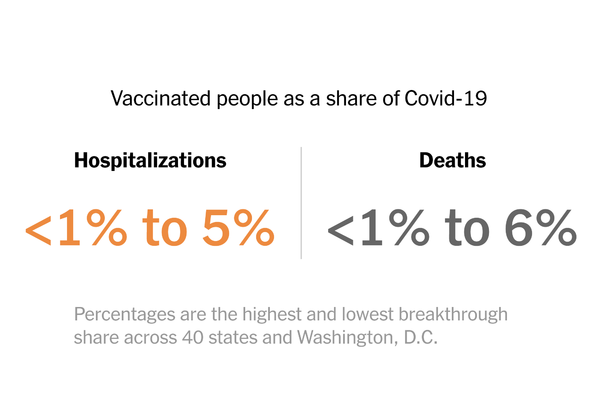
Serious coronavirus infections among vaccinated people have been relatively rare since the start of the vaccination campaign, a New York Times analysis of data from 40 states and Washington, D.C., shows. Fully vaccinated people have made up as few as 0.1 percent of and as many as 5 percent of those hospitalized with the virus in those states, and as few as 0.2 percent and as many as 6 percent of those who have died.
There is still a lot we do not know about so-called breakthrough infections — when fully inoculated people contract the virus. And there is some evidence that these cases are becoming more common as the more transmissible Delta variant surges. While vaccines have done a remarkable job at protecting a vast majority of people from serious illness, the data in the Times analysis generally spanned the period from the start of the vaccination campaign until mid-June or July, before the Delta variant became predominant in the United States.
Data on less serious breakthrough infections is not widely available, though it is possible those cases are rising. Data was not available for several states in which the virus has been surging, including Florida and Missouri.
Until recently, the Centers for Disease Control and Prevention estimated that fully vaccinated people accounted for less than 3 percent of coronavirus hospitalizations nationwide and less than 1 percent of virus deaths. But last week, the agency noted that those figures did not reflect new data involving the Delta variant and said it was actively working to update them. Only about 50 percent of people in the United States are fully vaccinated.
Looking at how many hospitalizations and deaths have involved fully vaccinated people is a common but crude measure of how well the vaccines are working.
As more people get shots, the percentage of hospitalizations and deaths among fully vaccinated people should rise. This may seem counterintuitive, so it’s important to understand why.
In a state with a high vaccination rate, a higher percentage of breakthroughs may simply reflect that fully vaccinated people are a bigger chunk of the population, or that there are few hospitalizations and deaths overall. Imagine a state where just two people are hospitalized but both are vaccinated — breakthroughs would account for 100 percent of the hospitalizations in that state, even though these cases were very rare.

In June, as the United States made headway in its vaccination campaign, European Union leaders recommended that member countries reopen their borders to Americans, a gesture meant to signal what they hoped would be the beginning of the pandemic’s end. They expected to be repaid in kind.
But nearly two months later, even as Europe has overtaken the United States in vaccinations, the United States’ borders remain closed to most European travelers, even those who are vaccinated.
Likewise, when Canada said last month that it would welcome back fully vaccinated U.S. residents beginning on Monday, U.S. officials made clear that they would not immediately reciprocate.
That the United States remains largely closed has dismayed people in the European Union and frustrated their leaders.
“We insist comparable rules be applied to arrivals in both directions,” Ursula von der Leyen, the president of the European Commission, the bloc’s executive arm, said last week at a news conference. Officials with the bloc have even suggested reimposing travel restrictions against U.S. travelers.
For some families, the continued ban has compounded one of the deepest sorrows of the pandemic — separation — as loved ones become ill across closed borders and family elders fear that they may never see their loved ones again.
Unmarried partners with different passports have struggled to keep relationships afloat, giving rise to the popular Twitter hashtag #loveisnottourism. And people offered jobs in the United States don’t know whether to accept them.
The White House has offered little explanation on why the restrictions remain, even though some countries with higher infection and lower vaccination rates don’t face a similar ban. At a news conference last week, Jen Psaki, the White House spokeswoman, cited the advice of medical experts and continued concerns about the Delta variant.
Yet if that posture has frustrated Canadians, they have not said so, at least publicly.
“Every country gets to set its own rules about how it will keep its citizens safe,” Prime Minister Justin Trudeau said.
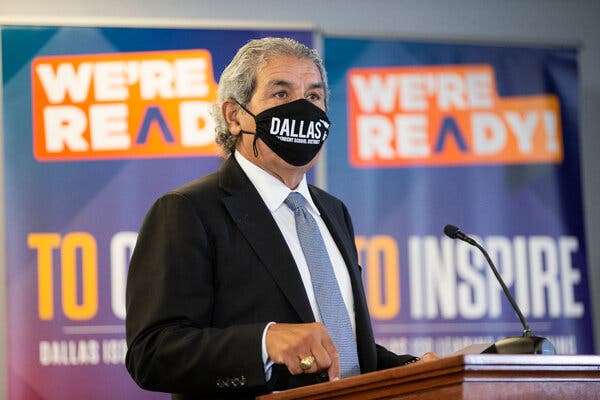
The summer began with the promise that vaccinated Americans could largely go maskless, and travel swelled over the Fourth of July weekend to prepandemic levels. But the celebrations have turned out to be short-lived as the Delta variant of the coronavirus surges across the United States and momentum gains for mandating Covid-19 vaccines and, once again, masks.
The United States is averaging more than 124,000 new virus cases each day, more than double the levels of two weeks ago and the highest rate since early February, according to a New York Times database. Hospitals in hot spots around the country are approaching capacity.
With all of this at play, President Biden has urged the private sector and state and local governments to ramp up pressure on the nearly one-third of eligible people in the country who remain unvaccinated. He has also ordered all civilian federal employees to be vaccinated or submit to regular testing and other restrictions.
And on Monday, the Pentagon said that it would require the country’s 1.3 million active-duty military troops to be vaccinated “no later” than next month. About 64 percent of active-duty service members are fully vaccinated — a rate that is low enough to have national security implications, because it could make it difficult to deploy troops to countries with strict requirements.
Defense Secretary Lloyd J. Austin III said in a memo that he would seek to speed up the mandate if the Food and Drug Administration grants full approval to the Pfizer vaccine before mid-September, which the agency aims to do. More mandates in the private sector are also expected after the F.D.A. approval.
New requirements are also being brought in at the state and local level.
In Vermont, Gov. Phil Scott said the state will mandate vaccines for state employees working in veterans’ homes, correctional facilities and psychiatric hospitals.
In Washington State, Gov. Jay Inslee said that most state employees and all health care workers must be fully vaccinated against the virus by Oct. 18 or risk losing their jobs.
More than two million health care workers in California also have to get vaccinated, largely without the option to submit to regular coronavirus testing. State employees who do not work in health care will still have the option to be tested if they are not vaccinated.
State and county employees in Hawaii will be required to provide their vaccination status by Aug. 16 or face regular testing, the governor said recently.
And even as several Republican-led states have barred businesses from requiring consumers to provide proof of vaccination, about a quarter of all U.S. hospitals are requiring staff members to be vaccinated, a spokesman for the American Hospital Association told CNN. Hospitalizations are soaring in areas with low vaccination rates.
Inoculations have picked up again in the country, but public health experts note that it takes weeks for the vaccines’ full effect to kick in. They say that more immediate measures, like mask mandates, are needed.
The surge in cases has led local leaders to defy Republican governors who have banned mask mandates in states like Florida and Texas, where the virus is surging.
Starting Tuesday, the Dallas public school district will require everyone on school property — including students, employees and visitors — to wear masks. The rule applies to the district’s nearly 154,000 students in 230 schools, and it comes as Gov. Greg Abbott remains one of the most strident opponents of mask mandates.
While Mr. Abbott has largely skirted the latest push for mask mandates — his office released a statement on Monday saying that he “has been clear that we must rely on personal responsibility, not government mandates” — his counterpart in Florida, Gov. Ron DeSantis, is threatening to withhold the salaries of local superintendents and school board members who enact them.
Others are turning to the courts. On Monday evening, the top elected official in Dallas County sued Governor Abbott, arguing that his ban on mask mandates violates Texas law.
Ethan Hauser and
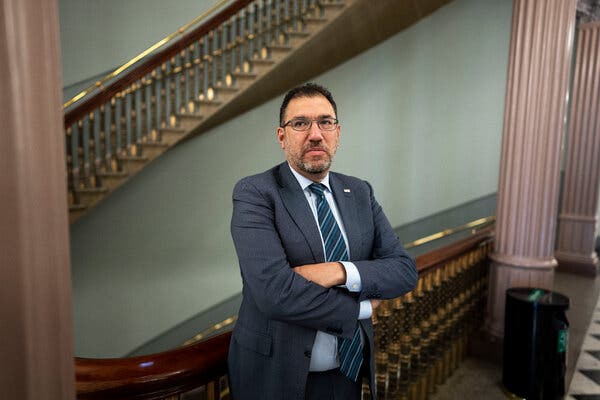
In March, Andy Slavitt, then a top pandemic adviser for President Biden, called Nick Clegg, Facebook’s vice president for global affairs, and delivered an ominous warning.
For many weeks, Mr. Slavitt and other White House officials had been meeting with Facebook to urge the company to stop the spread of misinformation about coronavirus vaccines.
Many Americans who declined to get vaccinated were citing false articles that they had read on Facebook, including theories that the shots could lead to infertility, stillborn babies and autism.
“In eight weeks’ time,” Mr. Slavitt told Mr. Clegg, “Facebook will be the No. 1 story of the pandemic.”
Mr. Slavitt’s prediction was not far off. Roughly three months later, with cases from the Delta variant surging, Mr. Biden said Facebook was “killing people.”
Mr. Biden’s comment, which he later walked back slightly, was the culmination of increasingly combative meetings with the company about the spread of misinformation.
The meetings have involved the top ranks on both sides. In March, Mark Zuckerberg, Facebook’s chief executive, called Ron Klain, the White House chief of staff, and discussed health misinformation. The White House grew so frustrated by Facebook’s answers in the internal meetings that at one point it demanded to hear from the data scientists at the company instead of lobbyists.
Talks between the White House and Facebook continue. But the rift has complicated an already tumultuous relationship just as Mr. Biden faces a setback on tackling the virus. The White House missed its goal of having 70 percent of American adults with at least one vaccination shot by July 4, and the highly contagious Delta variant has fueled a rise in cases since then.
Facebook has pushed back strongly against the White House’s criticism, accusing the administration in public of scapegoating the company for the administration’s failure to reach its vaccination goals. Andy Stone, a spokesman for Facebook, said the White House hadn’t given the company enough credit for promoting the vaccines.
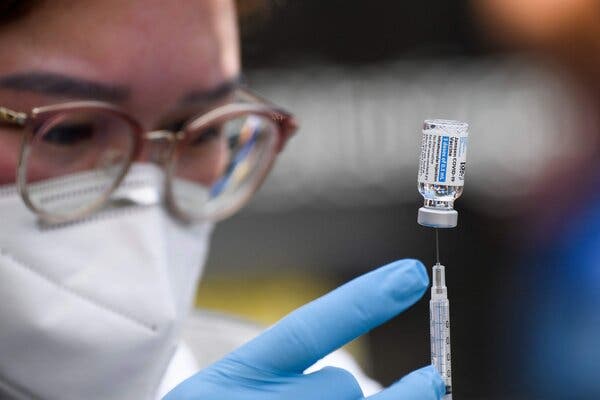
For adults, the benefits of the three coronavirus vaccines authorized in the United States outweigh the risks of serious side effects, which remain rare, according to a new report from the Centers for Disease Control and Prevention.
The Pfizer-BioNTech and Moderna vaccines have been linked to inflammation of the heart muscle, known as myocarditis, and the Johnson & Johnson vaccine may increase the risk of a rare blood-clotting disorder and a neurological condition known as Guillain-Barré syndrome. All of the conditions can be serious, but remain uncommon.
These small risks are exceeded by the benefits of the vaccines, which provide powerful protection against disease and death, experts concluded. For instance, every million doses of the Johnson & Johnson vaccine that are administered are likely to prevent roughly 1,800 hospitalizations and 140 deaths, while causing 14 to 17 cases of Guillain-Barré and 1 to 2 cases of the blood clotting disorder, according to the paper, which was published on Tuesday.
The paper is based on data reported to the federal Vaccine Adverse Events Reporting System. The database contains unverified reports, but researchers confirmed many of the cases used in their calculations, which were initially presented at a July meeting of the C.D.C.’s vaccine advisory group.
As of June 30, roughly 12.6 million doses of the Johnson & Johnson vaccine had been given to American adults. As of that date, there had been 100 reports of Guillain-Barré, which can cause muscle weakness and paralysis, a rate of 7.8 cases per million doses. The risk was highest for men between 50 and 64, who developed the side effect at a rate of 15.6 per million doses.
As of July 8, there had also been 38 reports of the clotting disorder following the Johnson & Johnson vaccine. The disorder, which is known as thrombosis with thrombocytopenic syndrome, causes an unusual combination of blood clots, often in the brain, with abnormal bleeding. The overall rate of the clotting disorder is 3 cases per million doses, though women between 30 and 49 get it at a higher rate of 8.8 cases per million.
By the end of June, there had also been 497 reports of myocarditis after the second dose of either the Pfizer or the Moderna vaccines, a rate of 3.5 cases per million doses. That increased to 24.3 cases per million for men between 18 and 29, among whom myocarditis was most common.
Information about all three possible side effects have been added to the vaccine fact sheets given to patients and clinicians. The C.D.C. and the Food and Drug Administration will continue to monitor reports of adverse events, the report noted.
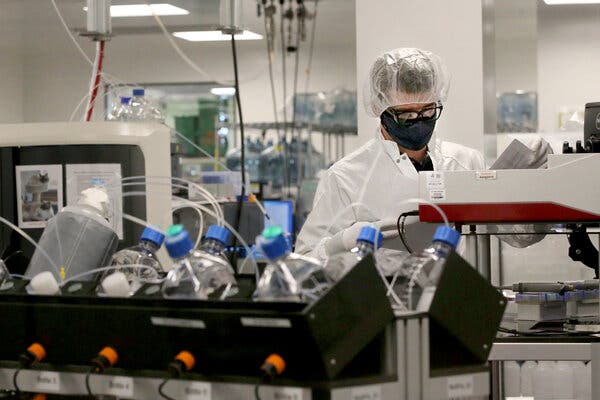
Moderna plans to build a facility in Canada to manufacture mRNA vaccines for the coronavirus and other respiratory viruses, the company announced on Tuesday.
The agreement is one of up to 10 such partnerships under discussion in Europe and the Asia-Pacific region, including in some low-income countries, Stéphane Bancel, Moderna’s chief executive officer, said in an interview.
With the smooth transfer of technical know-how, any company can learn to manufacture mRNA vaccines, he said. “There is no technology in the world that some people can do somewhere and cannot be done somewhere else.”
The factory in Canada is likely to be operational in a couple of years, Mr. Bancel said. Its primary mission is to help Canada, but in a pandemic, the facility may also produce vaccines to help the rest of the world, he said.
The manufacturing facility could also use Moderna’s mRNA technology to make vaccines for other respiratory viruses, including seasonal influenza and respiratory syncytial virus. “The idea is to really be able to provide a vaccine against all respiratory viruses,” Mr. Bancel said.
Global health experts and activists have pushed for vaccine manufacturers to teach companies in low-income countries to make coronavirus vaccines. But some experts have argued that making mRNA vaccines is too complex for most companies to master.
In June, a South African consortium established the first Covid-19 mRNA vaccine technology transfer hub, with the aim of training manufacturers from developing countries to produce the vaccines.
Moderna announced last week that the protection afforded by its vaccine holds steady for at least six months after the second dose. But company officials said booster shots might still be necessary this fall because of the Delta variant.
Experts have said that the data available so far do not support rolling out extra doses, except perhaps for some older adults and for people with weakened immune systems who did not produce a robust immune response after the first two doses. But given the dearth of vaccines in much of the world, the World Health Organization has called for a moratorium on boosters for everyone else till the end of September.
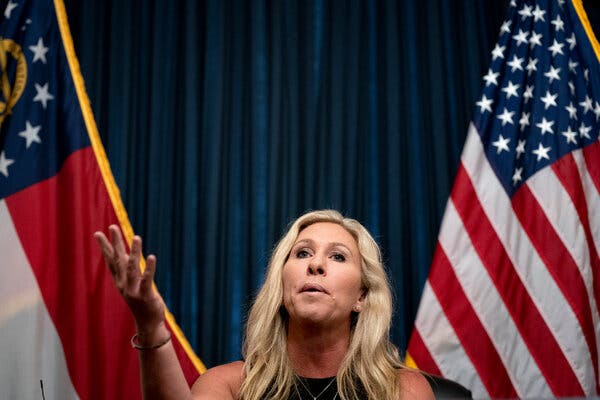
Twitter on Tuesday suspended Representative Marjorie Taylor Greene, Republican of Georgia, from its service for seven days after she posted that the Food and Drug Administration should not give the coronavirus vaccines full approval and that the vaccines were “failing.”
The company said this was Ms. Greene’s fourth “strike,” which means that under its rules she can be permanently barred if she violates Twitter’s coronavirus misinformation policy again. The company issued her third strike less than a month ago.
On Monday evening, Ms. Greene said on Twitter, “The FDA should not approve the covid vaccines.” She said there were too many reports of infection and spread of the coronavirus among vaccinated people, and that the vaccines were “failing” and “do not reduce the spread of the virus & neither do masks.”
The Centers for Disease Control and Prevention’s current guidance states, “Covid-19 vaccines are effective at protecting you from getting sick.”
In late July, the agency also revised its indoor mask policy, advising that people wear a mask in public indoor spaces in parts of the country where the virus is surging to maximize protection from the Delta variant and prevent possibly spreading the coronavirus. A recent report by two Duke University researchers who reviewed data from March to June in 100 school districts and 14 charter schools in North Carolina concluded that wearing masks was an effective measure for preventing the transmission of the virus, even without six feet of physical distancing.
Ms. Greene’s tweet was “labeled in line with our Covid-19 misleading information policy,” Trenton Kennedy, a Twitter spokesman, said in an emailed statement. “The account will be in read-only mode for a week due to repeated violations of the Twitter Rules.”
In a statement circulated online, Ms. Greene said: “I have vaccinated family who are sick with Covid. Studies and news reports show vaccinated people are still getting Covid and spreading Covid.”
Data from the C.D.C. shows that of the so-called breakthrough infections among the fully vaccinated, serious cases are extremely rare. A New York Times analysis of data from 40 states and Washington, D.C., found that fully vaccinated people made up fewer than 5 percent of those hospitalized with the virus and fewer than 6 percent of those who had died.
Twitter has picked up enforcement against accounts posting coronavirus misinformation as cases have risen across the United States because of the highly contagious Delta variant. In Ms. Greene’s home state, new cases have increased 171 percent in the past two weeks, while 39 percent of Georgia’s population has been fully vaccinated against the virus.
Ms. Greene’s Facebook account, which has more than 366,000 followers, remains active. Her posts on the social network are different from her posts on Twitter. She also has more than 412,000 followers on Instagram, which Facebook owns.
On Telegram, the encrypted chat app that millions flocked to after Facebook and Twitter removed thousands of far-right accounts, Ms. Greene has 160,600 subscribers.
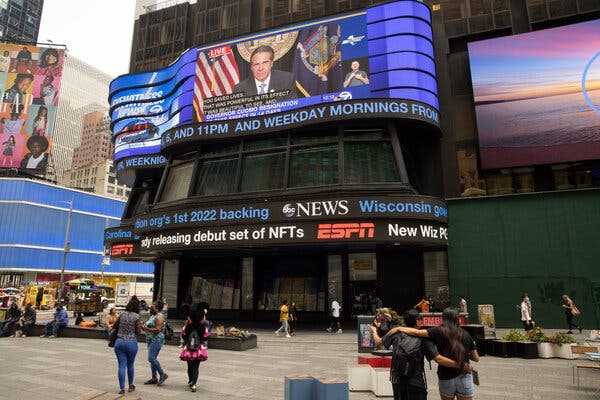
ALBANY, N.Y. — Gov. Andrew M. Cuomo of New York said on Tuesday he would resign from office, succumbing to a ballooning sexual harassment scandal that fueled an astonishing reversal of fortune for one of the nation’s best-known leaders.
Mr. Cuomo said his resignation would be effective in 14 days. Lt. Gov. Kathy Hochul, a Democrat, will be sworn in to replace him. She will become the first female governor of New York.
The governor framed his resignation as a necessary step given the firestorm of controversy surrounding his continued leadership, including an impeachment inquiry that he referred to as a “distraction” from pressing issues as the state recovers from the pandemic. “Given the circumstances, the best way I can help now is if I step aside and let government get back to governing,” Mr. Cuomo said. “And therefore that’s what I’ll do.”
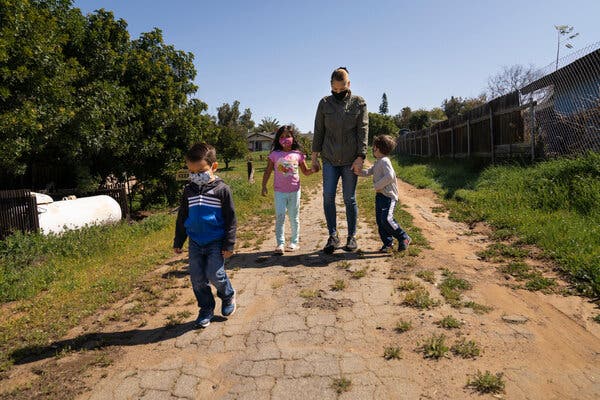
American parents of school-age children are more supportive of school mask requirements than mandatory coronavirus vaccines, according to a new survey. It found that nearly two-thirds of those parents want schools to insist on masks for students, teachers and staff members who do not have their shots.
The survey, to be released on Wednesday by the Kaiser Family Foundation, offers a window into the thinking of U.S. parents at the outset of another complicated school year. Debates over mask mandates are raging, the Biden administration is making a push for young people to get inoculated, and the Delta variant is sending more young people to the hospital with Covid-19.
The survey found that 63 percent of parents wanted masks required in schools for people who are unvaccinated. But parents’ views about vaccinating their children are complicated, the survey found, and tend to fall along the partisan lines that have shaped the discussion around vaccinating adults.
The Pfizer-BioNTech vaccine received emergency authorization from the Food and Drug Administration in May for use in people aged 12 and older. But more than half of the parents of school-age children said they still did not think schools should require it.
The Kaiser research, part of an ongoing study of public attitudes toward Covid-19 vaccination, is based on a nationally representative sample of 1,259 parents with a child under 18 in their household. It found that one in five parents of children ages 12 to 17 said their child would “definitely not” get vaccinated.
“Despite controversy around the country about masks in schools, most parents want their school to require masks of unvaccinated students and staff,” Drew Altman, the foundation’s chief executive, said in a statement. “At the same time, most parents don’t want their schools to require their kids get a Covid-19 vaccine despite their effectiveness in combating Covid-19.”
School officials around the country say they are deeply concerned about their ability to keep classrooms open this year, and many schools are promoting vaccination and even running vaccination clinics. But persuading parents to vaccinate their children is an uphill battle, educators say.
The Centers for Disease Control and Prevention reports that just 30 percent of students ages 12 to 15 are fully vaccinated; the rate is 80 percent among U.S. adults over 65.
“The biggest challenge is just making sure that folks are understanding that the vaccines are safe and that the vaccines mitigate the effects” of Covid-19, said Raymond C. Hart, the executive director of the Council of the Great City Schools, which represents large urban school districts.
The Kaiser study reflected that challenge. An overwhelming majority — 88 percent — of parents whose children were unvaccinated said they were “very” or “somewhat” concerned that not enough is known about the long-term effects of Covid-19 vaccines in children, and 79 percent expressed concern about serious side effects.
Nearly three-quarters of the parents said they worried the vaccines could hurt their child’s fertility, even though the C.D.C. has found no evidence of that.
Attitudes toward vaccination broke down along racial, ethnic and partisan lines.
Hispanic and Black parents were more likely than white parents to cite concerns that reflect access barriers to inoculation, including not being able to get a vaccine from a trusted place or believing that they might have to pay for it. The survey found that about two-thirds of Democratic parents favored mask and vaccine mandates, while more than three-quarters of Republicans opposed them.
